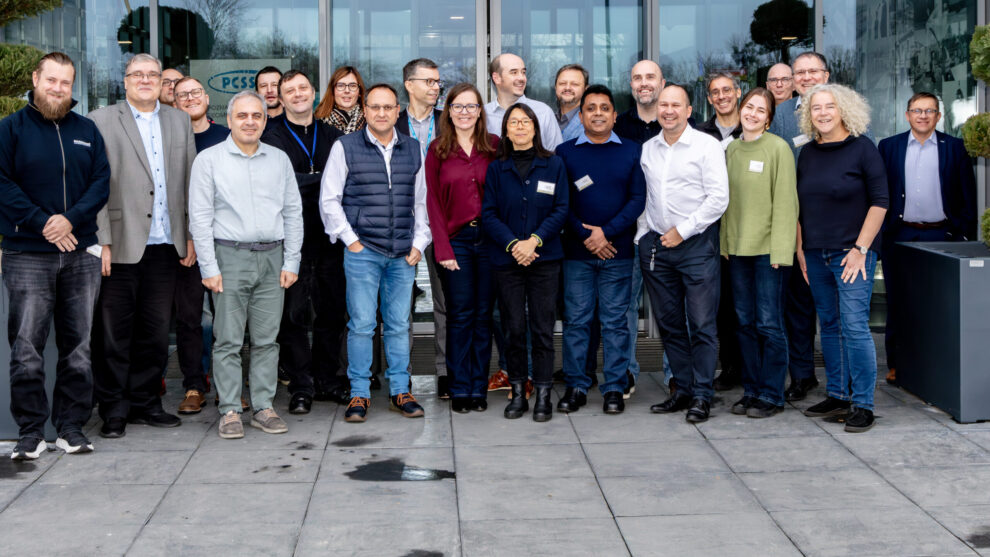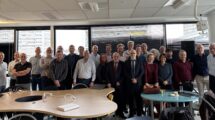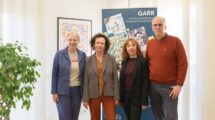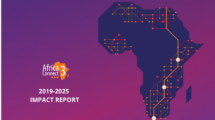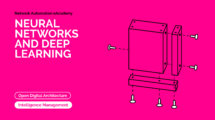Words: Daniela Brauner (GÉANT) and Tanja Maier (GÉANT)
28 on-site and 27 remote participants attended the first meeting of the Special Interest Group on Artificial Intelligence for NRENs (SIG-AI) meeting on 11 December in Poznan, kindly hosted by PSNC. The first meeting of the SIG showcased some of the many AI initiatives in the NREN Community, offered the opportunity to exchange experiences, and to start building a strong foundation for the group.
The idea of the SIG on Artificial Intelligence for NRENs was first discussed in a prep-meeting at the TNC24 Community Hub in France. With Rennes as a backdrop, the new SIG started to take shape. Thanks to the tireless work of the newly assembled Steering Committee, the many NRENs interested in contributing, PSNC hosting, and the support of the Community Programme, the SIG-AI had its successful first meeting in Poznan last week.

After a cozy group dinner on December 10 just off the Old Market Square, the SIG was official kicked-off on 11 December with a day full of presentations and discussions. After a welcome by Daniela Brauner (GÉANT) as Chair and Leonie Schäfer (DFN) as Coordinator, the scene was set by Dawn Ng (GÉANT) with a presentation on the GÉANT Community Programme.
Next was a session coordinated by PSNC, giving an overview of their projects with AI / Machine Learning (ML) components. Participants heard about AI for next generation networks, AI/ML for personalised medicine, various projects on Generative AI (GenAI), and AI for Humanity – on that, PSNC is working together with the city of Poznan on an AI model simplifying official documents with a web-based app. PSNC brought an overview about the use of AI for NRENs but also the perspective of the use of AI in research, showcasing some interesting scenarios on how NRENs are supporting the use of AI by the research community.

Photo by: Maciej Rutkowski | PSNC

Photo by: Maciej Rutkowski | PSNC
The members of the Steering Committee gave their view with showcases of NREN projects and ideas on what the role of an NREN can be regarding AI. ML is used in DFN-CERT to facilitate network situational awareness, SURF is training a Dutch GPT model, ASNET-AM showed the use of AI for HPC resource optimisation and scientific research in physics, earth sciences, and life sciences, including self-organising UAV swarms. The SIG-AI was also very conveniently timed as just one day before the kick-off, the EuroHPC Joint Undertaking (JU) revealed the seven sites to host the first European AI factories1. With GRNET as the managing entity for Pharos, the Greek AI factory aiming to work with the DAEDALUS supercomputer, the SIG-AI participants could hear first-hand what the plans for this flagship project would be. From GÉANT, Daniela presented about the impact of AI on the research lifecycle, accelerating research results and challenging NRENs services portfolios to advance. Furthermore, she also discussed the use of AI by NRENs, highlighting the importance of having the right questions to choose the best AI applications.
The last two sessions saw a variety of short presentations both on- and offline. NORDUnet introduced Whisper for Nordic languages, while DFN presented about the different roles NRENs can play in AI, particularly in supporting the research community with federated cloud services. LEARN focused on capacity building for GenAI and the development of training resources for NREN staff and bootcamps for youth, while RedIRIS presented proactive threat detection and automation tools. i2Cat highlighted a risk-assessment model for SOC teams based on user behaviour analysis. ACOmarket has been actively involved in securing AI services for Austrian academia – much of this has happened in the GN5-1 WP4 Services Incubator where L.I.S.A., a project integrating AI-driven language learning tools into university networks, could be piloted. Lastly, the SIG-AI finished with an engaging talk on ethics in AI development delivered by Magdalena Rzaca (GÉANT).

Photo by: Maciej Rutkowski | PSNC
The group also discussed in breakout groups about future AI-driven projects or initiatives they like to see in the next 2-3 years, and the key challenges, ethical considerations and potential risks associated with AI in NRENs.
The meeting last week proved that, even though SIGs might need to be categorised for the sake of website layouts, the SIG-AI is a truly horizontal group whose work touches on many other initiatives. As the roadmap matures, there will be new opportunities for collaboration with other SIGs too.
Check out the presentations and the meeting agenda here: https://wiki.geant.org/display/SIGAI/1st+SIG-AI+for+NRENs+Meeting+2024+-+Poznan%2C+Poland
The next SIG-AI meeting will take place in Prague on April 7, 2025, right before the Security Days 2025.
About the SIG-AI
SIG-AI for NRENs explores the potential applications of Artificial Intelligence (AI) within the context of National Research and Education Networks (NRENs). The group will delve into how AI can enhance cybersecurity, above-the-net services, network management, and network services currently offered by GÉANT and the NRENs. This SIG will also look at new EC regulations concerning AI and how they affect GÉANT and the NRENs.
More information about the SIG-AI for NRENs: https://community.geant.org/sig-ai/
[1] What are AI Factories? According to Council Regulation (EU) 2024/1732 amending the EuroHPC JU Regulation ((EU) 2021/1173), “AI Factory” means a centralised or distributed entity that provides an AI supercomputing service infrastructure which is composed of an AI-optimised supercomputer or an AI partition of a supercomputer, an associated data centre, dedicated access and AI-oriented supercomputing services, and which attracts and pools talent to provide the competences required to use the supercomputers for AI. In the same vein, “AI-optimised supercomputer” means a supercomputer that is designed primarily for training large scale, general-purpose artificial intelligence (“AI”) models and emerging AI applications.
